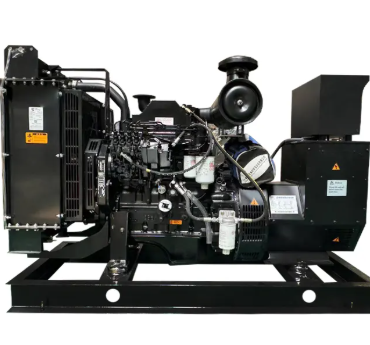Calculating Power Needs and Generator Sizing
Determining Total Wattage and Load Requirements
Sizing a diesel generator correctly starts with figuring out how much wattage each piece of equipment or appliance will need when running. The process really comes down to making a detailed inventory of everything that needs power, considering not just what runs continuously but also those short bursts of higher demand during startup or heavy usage periods. Anyone serious about getting this right should check manufacturer specs or reach out to suppliers for accurate wattage numbers instead of going off guesses. Getting these figures straight helps avoid situations where the generator struggles under load later on. Once all these numbers are in hand, picking the right sized generator becomes straightforward while still maintaining proper function across different operating conditions.
Converting kW to kVA for Accurate Sizing
Getting the hang of converting between kilowatts (kW) and kilovolt-amperes (kVA) matters a lot when it comes to picking the right size generator. kW basically measures what we call real power, while kVA looks at apparent power that covers both the useful power doing work plus the reactive power that doesn't actually do anything useful. Making this distinction helps avoid situations where generators get overloaded by unexpected electrical loads. The math works like this: kW equals kVA multiplied by something called the power factor. Let's say we have a power factor around 0.8; then our 100 kW generator needs about 125 kVA capacity (just divide 100 by 0.8). Most engineers stick to these calculations because they match up with what the industry expects, helping everyone size generators properly so they run smoothly without wasting money on oversized equipment.
Accounting for Starting vs Running Wattage
Picking the right generator means knowing the difference between starting watts (also called inrush current) and running watts (the steady state). Take a fridge or a power tool for instance they often need way more power at startup than when they're just running normally because of that big initial surge needed to get going. Most people forget about this gap in power requirements, which is why so many generators end up underpowered for what they actually need to handle. If a generator isn't sized properly for those spikes, appliances might not even start working correctly. That's why smart folks always look for generators that can handle those brief but intense power demands. This helps prevent blackouts and keeps everything operating without issues once it gets going.
Evaluating Fuel Efficiency and Environmental Impact
Diesel vs Other Fuels: Efficiency Comparison
When it comes to fuel options, diesel just has something special going for it in terms of energy content and how efficiently it works compared to regular gas or propane. The reason? Diesel packs more punch per gallon basically because of its higher energy density. That means these engines can crank out more power while burning less fuel overall, which obviously leads to better mileage at the pump and saves money on operating expenses too. According to some figures from the US Department of Energy, most diesel engines get around 30 percent better fuel economy than their gasoline equivalents. Businesses often pick diesel generators when they need reliable backup power without breaking the bank, especially during those unexpected blackouts or storms. But there's another side to this story worth mentioning. While diesel definitely gets the job done efficiently, it does produce quite a bit of pollution as well. We're talking about nitrogen oxides and particulate matter specifically. So companies have to weigh the benefits against what goes into the atmosphere, finding that sweet spot between keeping operations running smoothly and doing right by the environment.
Emissions Compliance and Regulations
Diesel generators need to follow strict emissions rules, like the ones put out by the EPA, if they want to keep running without causing too much harm to the planet. When companies stick to these rules, they cut down on things like carbon dioxide and other harmful stuff coming out of exhaust pipes, which helps protect nature and keeps people healthier. Failing to meet these standards isn't just bad for the environment though. Businesses risk getting slapped with big fines and losing customers who care about green credentials. On the flip side, when companies actually comply with the regulations, they stay on the right side of the law while showing they care about sustainability. The EPA and similar organizations have done research showing that newer diesel models that meet current standards emit way less pollution than older versions. This means businesses looking to go green still have options without completely overhauling their power systems.
Operational Considerations: Noise, Size, and Site Conditions
Noise Level Requirements for Different Environments
Picking out a diesel generator means paying attention to how loud it runs, particularly if it'll be near homes, businesses, or factories. Noise rules vary quite a bit depending on where the generator will operate. Take neighborhoods for instance they often need generators under 60 decibels while manufacturing zones typically allow around 85 decibels. Some newer quiet models run as low as 50 dB but older units can hit over 100 dB which is basically like standing next to a jackhammer. Getting something that fits within local noise laws makes sense both legally and socially nobody wants neighbors complaining or getting hit with fines. Those looking to reduce noise pollution might want to check out special soundproof boxes that wrap around generators or go for the newer inverter technology generators that just aren't as noisy in the first place.
Assessing Space and Portability Needs
Before buying a generator, figuring out how much space it needs and whether it will stay put or need to move around makes all the difference. Stationary units take up quite a bit of room and need to be installed permanently somewhere, which works best when there's plenty of open floor space like in garages or basements. Portable models are totally different though they can go wherever power is needed, so construction sites, outdoor events, or emergency backup situations benefit most from their flexibility. Don't forget to check if there's enough room not just for the generator itself but also for getting close to it later on when maintenance or fueling becomes necessary. Measure twice before committing to a particular model size. Look at both the actual dimensions of the unit and also think about how much extra space surrounds it for proper airflow during operation. Getting this right means finding a balance between what fits physically and what actually works well once installed.
Budgeting and Long-Term Cost Considerations
Initial Purchase Costs vs Operating Expenses
Picking out a diesel generator requires knowing what you're spending upfront compared to what it will cost to run day after day. The upfront stuff covers the actual price tag plus installation charges from professionals. But don't forget those hidden money drains down the road either fuel bills, regular maintenance checks, unexpected repair costs all pile up pretty fast. Take note diesel engines generally get good mileage per gallon, yet nobody knows when gas prices will spike next month or drop suddenly. That makes planning budgets tricky business indeed. Smart shoppers actually sit down with pen and paper (or spreadsheet software) to map out various spending scenarios side by side for different generator models available on market today. Industry insiders point out that running costs differ wildly depending on whether someone buys standby power units versus prime rated machines, plus how much they actually need to crank them during peak hours. Bottom line anyone who takes time to really look at numbers ends up saving hundreds if not thousands over several years just by making informed choices right from start.
Maintenance Requirements and Support Availability
Keeping up with routine maintenance work really matters if we want our diesel generators running at their best for years to come. When companies stick to proper maintenance schedules, they avoid those nasty surprise breakdowns that leave everyone scrambling when power goes out. Parts availability and local service options play a big role too since these factors directly impact how much time and money gets spent on upkeep. Generators located near well-established service centers tend to be cheaper to maintain over time. Many plant managers report seeing fewer shutdowns and longer equipment life spans after implementing regular maintenance routines, which makes all the difference in long term expenses. Finding trustworthy suppliers who can deliver quality components and technical assistance quickly remains crucial for maximizing both reliability and return on investment.
Consulting Certified Professionals for Optimal Selection
Role of Electricians and Generator Specialists
When picking out generators for particular power demands, electricians and generator techs really step into their element. These folks know exactly how to figure out what kind of power someone actually needs and then point them toward the best possible generator options. Most have gone through proper training programs and earned those important certification badges that keep things safe according to all the rules in the book. Take certified electricians for example—they walk around sites checking out the existing electrical loads and then come back with suggestions about generators that fit both the size requirements and run efficiently too. We see this kind of smart installation work wonders in manufacturing plants or hospitals where even a short power outage could spell disaster. The real magic happens when pros apply their deep knowledge about these systems, making sure everything connects properly so there's no unexpected blackout messing up operations.
Custom Solutions for Unique Power Needs
Businesses facing special power needs often find that off-the-shelf generators just don't cut it. That's why many turn to custom built solutions instead. Experts in the industry work closely with companies to design systems that match their exact requirements while making operations run smoother. When everything connects properly, the power supply matches what the business actually needs day to day, cutting down on wasted energy and improving how well things function overall. Take data centers for instance most cannot afford even a minute of downtime. Custom made systems have helped these facilities stay online constantly, thanks to engineers who really get what makes their power infrastructure tick. The bottom line? Getting expert help means companies can handle their electricity needs better without breaking the bank or harming the environment in the process.
FAQs
How do I determine the total wattage requirements for my generator?
To determine the total wattage requirements, create a list of all equipment you intend to power, noting both their continuous and peak loads. Consult the equipment manuals for specific wattage ratings to ensure accurate assessment.
What is the difference between kW and kVA?
KW represents actual power, whereas kVA accounts for apparent power, which includes both working and reactive power. Converting kW to kVA helps in accurately sizing your generator to handle real-world electrical demands.
Why is it important to distinguish between starting and running wattage?
Starting wattage accounts for the initial power surge when equipment starts, which can be significantly higher than running wattage. Accounting for this ensures your generator can handle these peak power demands and avoid power outages.
Why choose diesel over gasoline or propane for generators?
Diesel has a higher energy density, leading to improved fuel efficiency and lower operational costs. However, diesel generators must comply with emissions regulations due to environmental concerns.
What maintenance is required for diesel generators?
Regular maintenance, including fuel checks, oil changes, and part inspections, is essential. Having reliable support services and readily available replacement parts can enhance efficiency and prolong the generator's lifespan.

